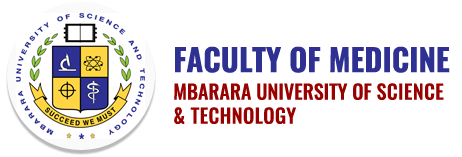Background
Faculty of Medicine began in 1989 offering one programme Bachelor of Medicine and Surgery(MBChB) with a humble number of 43 students and 5 teaching staff this was when the National Resistance council passed a Statute establishing Mbarara University of Science and Technology(MUST).
MISSION
To train health professionals (doctors, nurses, Pharmacists and laboratory scientists) who are acquainted with different working conditions and health needs of society and therefore who will be prepared to work in rural as well as urban settings.
To train a new generation of health professionals(doctors, nurses, Pharmacists and laboratory scientists) capable of playing different roles in the community as health care providers, educators and agents of socio-economic development.
The training offered includes basic science education, broad laboratory and clinical skills, attitudes and abilities so that graduates are adequately prepared and willing to participate in community designed to promote health and economic development.
VISION.
To be recognized as a centre of excellence in Health Sciences Education, Research and Community Service.
To become the most competitive medical training institution in the region guided by responsible, transparent, accountable and unshakable committed staff.
PHILOSOPHY
The Faculty follows a Community Based Medical Education (CBME) as its underlying Philosophy.
Right from the start, students are exposed to concepts about community problems which is a focus in the student training.
CBME is a strategy that aims at achieving a more effective implementation of primary health care (PHC). The aims of CBME programmes are to train health professionals who:-
Are able to work within the community considering factors in the community that contribute to disease and impact of diseases in the community.
Are acquainted with rural conditions and are prepared/ trained and ready to work in such conditions.
Can serve the health needs of the society in which they work The Faculty places great emphasis on CMBE. This is in recognition of the great need for health professionals who are appropriately trained to deal with health problems and needs of the Ugandan population; professionals who are competent to implement the PHC strategies and other national health polices, and who have the right aptitudes towards prevention of ill health, and the promotion and maintenance of good health.
Faculty Objectives
To produce quality and relevant professions’ graduates; Doctors, Nurses, Laboratory Scientists, Pharmacists and Counselors.
To provide human resource for health care in the region and world over for social, economic development.
To carry out research as a way of generating new knowledge and disseminate the findings through publication as a way of preserving knowledge.
To improve the knowledge and skills of practicing health professionals
To provide community services by engaging in prevention and health education for promotion and maintenance of good health in communities.
FACULTY OF MEDICINE ORGANIZATION STRUCTURE
The faculty is headed by the Dean, and the Faculty Board. The Faculty Board is composed of Heads of Departments who head the department that constitute the faculty and the Dean chairs all the Faculty Board meetings. The faculty Board is responsible for policy formulation, decision making and implementation at the faculty level. It is also responsible for the co-ordinations, management and implementation of various programs in the Faculty through departments as faculty committees as detailed in the Sub-link. There are over 100 academic staff as detailed in the sub link involved in teaching both the undergraduate and postgraduate programmes and in research.
